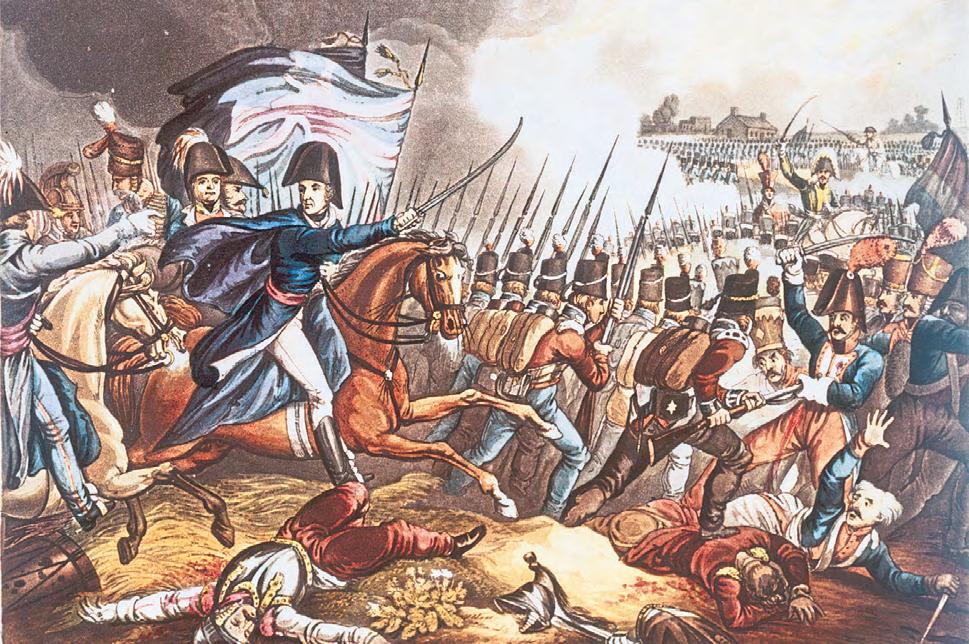
He sent, therefore, an army to seize the latter. Ahmad knew he did not have the advantage of numbers on his side. But he did possess above-average common sense. So, at the back of his rather slim cavalry unit, he placed row upon row of oxen, with soldiers mounted on them. From across the battlefield it now looked like Ahmad had a formidable cavalry, ready to devour the enemy. Firuz's generals and troops panicked. In the end, Ahmad's smaller, emaciated force carried the day. Soon the winner planted himself on the throne. It was studded with diamonds and gems and looked rather grand. But somewhere Ahmad knew that he owed his power to a herd of bullocks.
Willingly or otherwise, humanity's fortunes have been shaped by animals to a degree we do not always recognize. Empires have been built and saved, quite literally, on the backs of animals. When in 1573 Gujarat rebelled against the Mughals, for example, the province would have been lost. But Emperor Akbar reached the scene with reinforcements, turning the tide swiftly. How? His men and he rode non-stop for nine days. Usually, according to his son, Jahangir, the distance took two months to cover. Akbar was able to do it in record time by traveling chiefly on camels capable of covering 200 kilometers a day. His arrival in Gujarat was a twist nobody had expected, changing the course of events. Those camels helped the Mughals hold on to one of the wealthiest provinces in India, enabling subsequent conquests.
Elephants were the other big asset in warfare, though unlike camels they were quite expensive to maintain, requiring enormous amounts of food and water. Often assigned several attendants, in battle elephants could ram their way through enemy ranks with spectacular effect. It is no wonder then that kings in Odisha at one time advertised themselves as Gajapatis, Lords of the Elephant. But the poor creatures suffered.
Diese Geschichte stammt aus der November 09, 2024-Ausgabe von Mint Mumbai.
Starten Sie Ihre 7-tägige kostenlose Testversion von Magzter GOLD, um auf Tausende kuratierte Premium-Storys sowie über 8.000 Zeitschriften und Zeitungen zuzugreifen.
Bereits Abonnent ? Anmelden
Diese Geschichte stammt aus der November 09, 2024-Ausgabe von Mint Mumbai.
Starten Sie Ihre 7-tägige kostenlose Testversion von Magzter GOLD, um auf Tausende kuratierte Premium-Storys sowie über 8.000 Zeitschriften und Zeitungen zuzugreifen.
Bereits Abonnent? Anmelden

Reduction of energy costs in the telecom sector
With telecom infrastructure companies looking for newer ways to cut back on energy costs, battery restoration technology provides telecom infrastructure firms with a viable, economical and green solution for uninterrupted power supply

Skip cheese and sip wine in Switzerland
Beyond chocolates and cheese, there's another Swiss gem to discover — vineyards that have been passed down through the generations
Bankers aren't always frank about bank regulation
The 'world's banker' Jamie Dimon, CEO of JPMorgan Chase, speaks his mind even if it means taking swipes at US regulators.

Baku: A climate breakthrough looks depressingly bleak today
The success of fossil fuel-favouring politics threatens the planet

Global solidarity levies can play a vital role in our climate efforts
Solidarity taxes could support redistributive measures and optimize how we collectively tackle a great challenge of our times

Speak for the Earth: It's the least we should do
This year's Booker prize winner turns our gaze to the planet from orbit and reminds us of the climate disaster that looms. Can odes sung to Earth move the world to act in its defence?
Aim for an efficient carbon market right from the start
India's economy is projected to grow dramatically over the next few decades. In nominal terms, it may double in size by 2030. This is exciting, but it comes with a significant risk.
Why health insurers refuse to cover certain treatments
While 12 modern treatments are covered, many advanced procedures are yet to be included
Address economic distress with structural reforms and not doles
Cash transfers may offer short-term relief but raising worker incomes is the only lasting solution
FUNDING FOREIGN EDUCATION: SHOULD YOU SAVE OR BORROW?
Education financing needs vary, but early planning is key to building your desired corpus